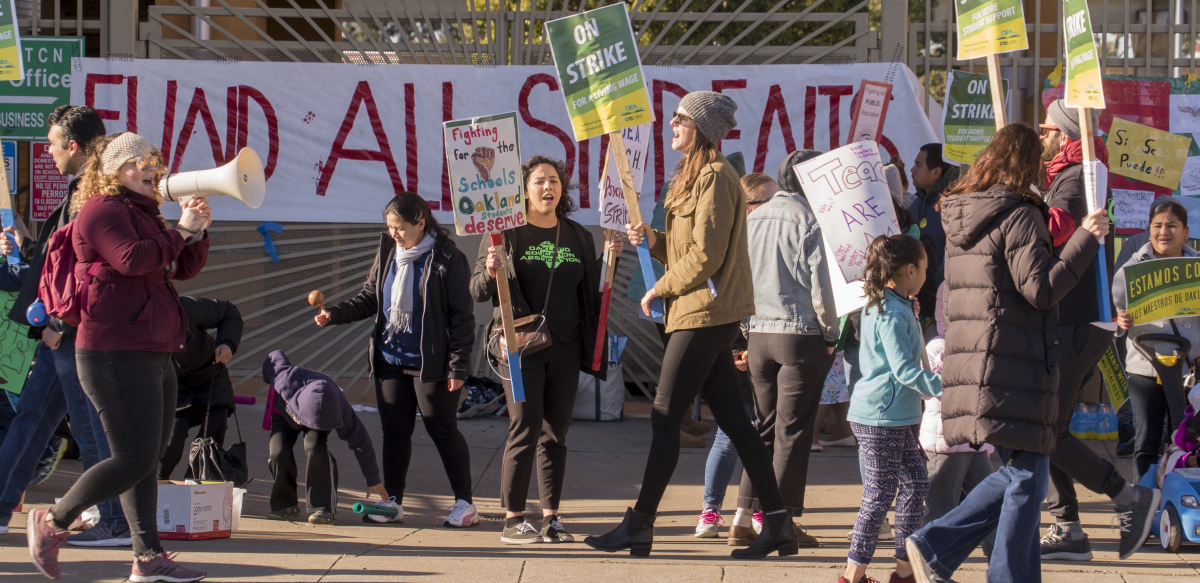'It's Different Here' Is No Excuse

We have to overcome the idea that our circumstances are so unique that fighting back is impossible. Photo: Joe Brusky. Cropped from original
I talk with labor activists all across the country. Plenty are inspired by strikes that happen elsewhere. But over and over I hear the same excuse for why they can’t make big demands or go on strike themselves: “It’s different here.”
How is it different? Pick your poison: It’s the South. It’s the public sector. It’s illegal. Our union leaders would never support us. Everyone is too scared. Too apathetic.
This year, the teacher union movement is supplying the best reply to “It’s different here.” Here’s what we’ve seen in 2019 so far:
Los Angeles teachers struck the second-largest school district in the country. Their new contract is a pathbreaking victory against privatization.
Meanwhile teachers at three Los Angeles charter schools in the Accelerated network went out on the second charter strike in U.S. history. They won a $10,000 bonus and an increased employer contribution to their health care.
Following close on their heels, more charter teachers struck at four schools in the Chicago International Charter School chain. They won a pay increase and limits on class size.
STRIKES FOR ALL SEASONS
That’s not all. Denver teachers went on strike and won a pay scale that’s based on years of experience and degrees earned, reining in a chaotic system of merit pay.
West Virginia teachers and other school employees went on a political strike against legislation that was intended to punish them for last year’s walkout. The proposed law would have legalized charter schools and vouchers—but it took just one day of picketing across the state to kill the bill.
And in Oakland, teachers organized an open-ended strike for smaller classes, a living wage, and an end to privatization and school closures. They secured an 11 percent raise and made gains on class size.

SUPPORT LABOR NOTES
BECOME A MONTHLY DONOR
Give $10 a month or more and get our "Fight the Boss, Build the Union" T-shirt.
These strikes are rural and urban, local and statewide, public and private, legal and illegal, in red states and blue, pushed from the bottom and the top. Taken together, they should dispel the idea that workers can win only when the stars are aligned just so.
I know what you’re thinking: Those are all teachers! Things really are different for me. But the mood in these unions too was “go along to get along” for decades—until teachers decided to shake things up.
All workers have power through collective action. That’s what organizing is about.
ANTIDOTE TO FUTILITY
Not every strike is successful. I don’t want to sugarcoat the risks. But personally, I think the worst feeling in the world is that there’s nothing we can do.
I’m talking about futility—the sense that the boss is too powerful, that working people aren’t smart or creative enough to win.
Organizing is the antidote to futility. It’s how we come to understand our power. And that feeling is strongest during a successful strike. Just ask the 60,000 people who turned out to mass rallies in Los Angeles three times in five days!
Union density is astonishingly low. Many people have little or no experience with unions, much less strikes. It’s little wonder that folks feel so beaten down.
These strikes show that we don’t have to accept whatever b.s. the boss shovels onto us. We can fight back. We can even win. But first we have to overcome the idea that our circumstances are so unique that fighting back is impossible.
The next time you hear someone say “It’s different here,” give them a dose of hope. Tell them about the amazing strikes that are happening all over the country. And maybe get them a subscription to Labor Notes.





